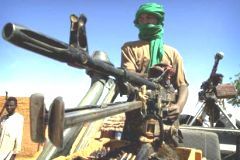Darfur rebels dispute Sudan state media report
By MOHAMED OSMAN, Associated Press Writer
KHARTOUM, Sudan, Dec 21, 2004 (AP) — Sudan’s government has ordered troops in three areas of Darfur to observe an immediate cease-fire, state media reported Monday, and an international observer said the government will ask rebels to do the same.

|
|
A Sudan Liberation Army rebel stands guard at Gellab, a village in the desert east of El Fasher, the capital of North Darfur state November 8, 2004. (Reuters). |
However, a rebel spokesman disputed the cease-fire report and threatened to end peace talks if government troops did not withdraw from Darfur, a western region the size of France. Also, an international observer said he could not verify that the government had stopped its attacks.
“I think it is a short period to evaluate to say they are complying or not,” said Jean Baptiste, the African Union’s senior political officer in Sudan.
Foreign Minister Mustafa Osman Ismail said troops have been instructed to implement the cease-fire decision made Sunday but also were urged to “be vigilant to apply their (right) of self-defense against any (rebel) operation,” according to the state-run Sudan Media Center.
A U.N. spokeswoman said Sunday that Sudan has pledged to halt military operations in Darfur.
Baptiste confirmed that the Sudanese government had asked the AU and the United Nations to forward a cease-fire request to the rebels, but he said he did know exactly when that request would be passed on. He also said the government announced it was ready to leave territory taken after an April 8 agreement with the rebels.
The AU is monitoring an earlier, largely ignored cease-fire pact in Darfur, using about 800 AU soldiers and 100 observers.
A rebel spokesman attending peace negotiations with AU mediators in Abuja, Nigeria, said the insurgents received no formal notification of Sudan’s unilateral cease-fire offer.
“What they’re saying and what they’re doing are completely different,” said Ahmed Tugod Lissan, spokesman for both rebel groups involved in the peace talks.
“The situation on the ground is very serious. The Sudanese government is building up for war and the war is continuing.”
He added: “If the Sudanese government refuses to pull back the troops it will lead to the collapse not only of the talks in Abuja but the entire peace process.”
AU mediators met separately in Nigeria with rebel and government delegates, hoping to revive stalled peace talks, AU spokesman Assane Ba said. Three earlier rounds of negotiations failed to calm Darfur, home to what the United Nations has called the world’s worst humanitarian crisis.
In Washington, the United States expressed grave concern Monday about escalating violence in Darfur and blamed both sides.
“We urge both sides in the strongest terms to cooperate fully with international humanitarian efforts,” State Department spokesman Richard Boucher said.
Disease and hunger have killed 70,000 people in Darfur region since March, the World Health Organization says. Nearly 2 million are believed to have fled their homes since the crisis started almost two years ago.
On Sunday, an AU helicopter was shot at by unknown gunmen but landed safely.
“Information is still being gathered on this incident and we are still waiting for a relevant African Union report,” said Ismail, the Sudanese foreign minister.
Baptiste said he was consulting with AU headquarters about the attack.
The crisis in Darfur was sparked in February 2003 when two non-Arab African rebel groups started fighting for more power and resources from the Arab-dominated government in the capital, Khartoum.
The Sudanese government responded by backing the Janjaweed, an Arab militia, which is accused of targeting civilians in a campaign of murder, rape and arson. The United States accuses the Janjaweed of committing genocide.
